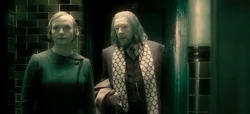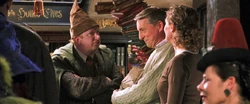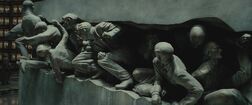- "Non-magic people (more commonly known as muggles) were particularly afraid of magic in medieval times, but not very good at recognising it."
- —Excerpt from A History of Magic by Bathilda Bagshot[src]
A Muggle (also called a No-Maj in the singular, No-Majs or No-Majes[2] in the plural in the United States[1]) is a person who is born to two non-magical parents and is incapable of performing magic. Although, most muggles are the offspring of two muggles, the offspring of two squibs or of a squib and a muggle would be, by definition, a muggle. Muggles are not to be confused with Squibs, who also lack magic but are born to at least one magical parent.
Most Muggles are not aware that magic exists at all and that those with it have organised their own society largely separate from the Muggle world. The few Muggles that do know of the existence of the wizarding world are usually parents, or close relatives, of witches and wizards (for example, Hermione Granger's parents, Mr. and Mrs Granger, knew of the wizarding world because of their daughter, as did Harry Potter's aunt and uncle). The term "Muggle" is widely used in the wizarding world, and, while it could be considered derogatory, generally is not intended to be offensive; in fact, it is often used affectionately, often by Arthur Weasley, who has a great fondness for Muggles and learning about them and their way of life. Some of the more prejudiced members of the community, however, use the word in the same context as the epithet "Mudblood," though the term is generally associated with Muggle-borns (witches or wizards that come from non-magic families/Muggles). These wizards or witches believe that Muggle-borns have "stolen" magic and thus are actually Muggles, rather than legitimate wizards or witches.
The Muggle and wizarding world[]
Wizarding law[]
- "Each wizarding governing body will be responsible for the concealment, care and control of all magical beasts, beings, and spirits dwelling within its territory's borders. Should any such creature cause harm to, or draw the notice of, the Muggle community, that nation's wizarding governing body will be subject to discipline by the International Confederation of Wizards."
- —Clause 73 of International Statute of Wizarding Secrecy[src]
Since the International Statute of Wizarding Secrecy was enacted in 1692, wizards and witches have hidden the existence of magic from Muggles.[3] Thus, most Muggles are either afraid of magic or believe it to be nothing but a childish fantasy. Wizards and witches hide their world with Muggle-Repelling Charms, and if a Muggle witnesses a magical event or sees a magical creature such as a dragon, their memories are erased. Confundus Charms are also occasionally employed to encourage Muggles to ignore any magic they witness. Violations of the Statute of Secrecy are prosecuted by the Improper Use of Magic Office, and the Misuse of Muggle Artefacts Office tries to keep bewitched items away from Muggles.

Hogsmeade Village, an exclusively magical settlement
Wizards and witches thus organised their own society, known as the wizarding world, distinct from that of Muggles. There are some exclusively magical settlements, such as Hogsmeade, but also magical communities hidden within largely Muggle ones, such as in Ottery St Catchpole and even in London. Magical people also have a separate currency system and government. The Ministry of Magic maintains relations with the Muggle Prime Minister, but they do not appear to be subordinate to the Muggle government.[4]
Overlapping of worlds[]
- "Most wizards these days are half-blood anyway. If we hadn't married Muggles we'd've died out."
- —Ron Weasley discussing blood purity[src]

Muggle Mrs Cole and wizard Albus Dumbledore talking about Tom Riddle
However, the Muggle and magical worlds are tied together in some ways. For instance, Muggles sometimes marry wizards or witches and thus become aware of the wizarding world, as occurred with Mr Finnigan when he married a witch. Muggles also occasionally produce a magical child. In Britain, these Muggle-born wizards and witches will often join the wizarding world when they are invited to attend Hogwarts School of Witchcraft and Wizardry. Their parents will thus be informed of the existence of the wizarding world, and may even enter it on occasion, as Hermione Granger's parents did when they accompanied their daughter and the Weasley family to Diagon Alley to shop for school supplies in 1992.[5]
Some Muggles are aware of the magical world but, through choice, choose to ignore it, such as Vernon Dursley, who was aware his sister-in-law was a witch but otherwise remained intentionally ignorant of the wizarding world until he was forced to recognise it with the arrival of his nephew, Harry Potter.

Muggles Mr and Mrs Granger with wizard Arthur Weasley in Diagon Alley
In addition, there are secret connections maintained between the two societies at the governmental level; for example, the Minister for Magic occasionally consults with the Prime Minister of Great Britain on issues affecting both societies, and it is clear that the Prime Minister is aware of the wizarding world. Each Prime Minister, on the day appointed to office, gets a visit from the current Minister for Magic. The visit encompasses telling the Prime Minister of the existence of magic and that they will only ever need to meet when there is something going on in the wizarding world that might affect the Muggle world.[6]
Muggle attitude towards magic[]
- "Wizards represent all that the true 'Muggle' most fears: They are plainly outcasts and comfortable with being so. Nothing is more unnerving to the truly conventional than the unashamed misfit!"
- —J. K. Rowling regarding how Muggles view wizards[src]

The Muggle Dursley family, who despised magic
Historically, Muggles tended to consider those who practised magic to be evil, leading to the burning of witches during the Middle Ages. In response, some wizards and witches managed to use Flame-Freezing Charms to render the fire harmless. Thus, most considered the Muggle efforts completely useless.[7] However, such acts were part of the reason that wizards decided to go into hiding. Many wizards were killed by these incidents.[8] Some innocent Muggles were being burned as witches, magical children born to Muggles were often persecuted when their magical abilities surfaced, and some Muggles tried to make magical people perform magic for their own ends. Magical creatures left the Muggles too, as many of them were extinguished, probably because of overhunting and ecosystem destruction.[3]

Muggele dentists Mr and Mrs Granger, who were accepting of magic
In the modern world, few Muggles believe in magic. Some who are aware of the wizarding world are accepting of it, such as Hermione Granger's parents.[5] Others, however, respond negatively. The Dursley family, for instance, had a "very medieval" attitude towards magic. Petunia Dursley considered her sister Lily Potter a "freak" for her abilities, although this was originally prompted by envy of them, so she would not have thought of her sister like this if she too had had those powers.[9] She, her husband, and son, Dudley were suspicious of magic, and thus treated their wizard nephew Harry Potter badly and distrusted anyone associated with magic. They also tried to prevent him from learning of his magical heritage, without success.[4] Ariana Dumbledore was attacked and severely traumatised by Muggle boys after they saw her use magic and she was unable to show them how to do it. So this was not as much an act of prejudice than an act of envy, like Petunia.[9] Tom Marvolo Riddle also once suggested that his Muggle father abandoned Merope Gaunt, his pregnant wife because he discovered that she was a witch.[5]
It has been suggested by some wizards and witches that Muggles choose, on some level, not to believe in magic, since there are inevitably some occasions at which they are exposed to magic but seem to ignore it or attribute it to other causes.[5]
Wizarding attitude towards Muggles[]
- "Alecto... teaches Muggle Studies, which is compulsory for everyone. We've all got to listen to her explain how Muggles are like animals, stupid and dirty, and how they drive wizards into hiding by being vicious toward them, and how the natural order is being re-established."
- —Neville Longbottom on Death Eaters' teaching while Lord Voldemort was in power[src]
Many magical people, particularly pure-bloods, consider their own world superior to that of Muggles. Some consider Muggles little better than animals and hate them. For example, Araminta Meliflua once proposed that the Ministry of Magic make Muggle hunting legal.[10]

The Magic is Might statue that depict Muggles in their 'rightful' place
Dark Wizard Gellert Grindelwald originally intended to conquer the world and make Muggles subservient to wizards. Lord Voldemort and his Death Eaters killed Muggles for amusement during the First and Second Wizarding Wars. They often extend this hatred to Muggle-borns as well, considering them to be unworthy of magic and not "real" wizards or witches. During the Second Wizarding War, Muggle-borns were rounded up by the Ministry of Magic (on Voldemort's orders) and accused of stealing magic from wizards; a way of thoroughly humiliating them instead of killing them outright.[9] In 1997 during the height of the Second Wizarding War a statue was created that illustrated Muggles in their "rightful place", crushed by the might that is magic. This statue resided in the Ministry atrium and acted as a symbol of Lord Voldemort's new regime.
Others, however have more favourable opinions. The Ministry also tries to protect Muggles from the Dark Arts and other potentially harmful magic things with its Misuse of Muggle Artefacts Office.[5] Muggle Studies is also an optional subject at Hogwarts School of Witchcraft and Wizardry that strives to educate magical children about the Muggle world and to foster understanding of it. One witch, Carlotta Pinkstone, famously advocated for the repeal of the International Statute of Wizarding Secrecy. She believed in the idea that Muggles should know about magic, and performed magic publicly on several occasions.

Harry Potter surrounded by Arthur Weasley's collection of muggle objects
Arthur Weasley is very interested in how Muggles function without the aid of magic, and collects Muggle items, though he often gets their names and other facts wrong. He has a large collection of batteries and electric plugs. He was ecstatic to meet Hermione Granger's Muggle parents, inviting them to have a drink with him at the Leaky Cauldron. During Harry Potter's stays at the Burrow, Arthur often sat next to Harry to ask him questions about Muggles. He was also interested to learn how the Muggle post office and telephone work,[5] and his greatest ambition was to learn how aeroplanes stay up.[11]
Some Muggle pastimes have also found favour with those in the wizarding world. Famously, Albus Dumbledore's Chocolate Frog Card proclaims his liking of the Muggle sport of ten-pin bowling, and he also developed a fondness for a Muggle sweet called sherbet lemon.[4] Some elements of Muggle pop culture have also bled over into wizarding culture, such as rock and roll music which is performed by groups such as the Weird Sisters.[12] The concept of "tabloid journalism" is also alive in the wizarding world.[13]
Such wizards and witches are considered "blood traitors" by prejudiced pure-bloods such as the Malfoy and Black families for their belief in Muggle equality and attempts to protect them. Brutus Malfoy once claimed that it was a sign of weak magic to enjoy the company of Muggles,[14] and his descendant Lucius Malfoy tried to sabotage Arthur Weasley's career after he proposed the Muggle Protection Act in 1992.[5]
Unlike their United Kingdom counterparts, American Witches and Wizards to not seem to view Muggles or in this case "No-maj" as blind buffoons who wouldn't notice anything; rather there seems to be a fear of No-maj in America.
Characteristics[]
Although Muggles have no magical abilities, they have technology to make up for it. But many sophisticated muggle technology such as electricity naturally does not work well inside the wizarding world, unless it is magically powered, in this case Arthur Weasley's Ford Anglia. Muggles never understand magic, even going to extreme lengths (and sometimes making themselves seem rather foolish to wizards) to ignore obvious occurrences of magic, and wizards never understand technology. Even though the Muggles lack magic, they still pose a threat to the wizarding world.[5] An advantage they have is that they outnumber the population of pure-bloods and wizards by a significant proportion. Their technologies, like firearms and nuclear weapons, proved to be just as dangerous as magic. Muggles flourished in territories way larger than the magical world. As such the Minister for Magic and the Prime Minister maintain a good relationship for the safety of both worlds.
Muggle inventions[]
Muggles have found many fascinating ways to make up for their lack of magic, using technology to perform tasks for which wizards use magic. Examples of such inventions include:
- Electricity (misunderstood and mispronounced by some wizards, including Head of the Misuse of Muggle Artefacts Office, Arthur Weasley)
- Telephone (called a "fellytone" by some Wizards, such as Ron Weasley)
- Rubber duck (used as entertainment to persuade Muggle children to bathe)
- Video Games
- Television
- The Underground
- Escalators (mispronounced by Molly Weasley as "escapators")
- Bus stops
- Firearms (often called "firelegs" by some Ministry officials)
- ↑ 1.0 1.1 "Fantastic Beasts: Rowling reveals the American word for 'Muggle'" from Entertainment Weekly
- ↑ "J.K. Rowling on Twitter: ".@Weasley_dad In my wizarding world, there were no skin-walkers. The legend was created by No-Majes to demonise wizards.""
- ↑ 3.0 3.1 Template:FB
- ↑ 4.0 4.1 4.2 Harry Potter and the Philosopher's Stone
- ↑ 5.0 5.1 5.2 5.3 5.4 5.5 5.6 5.7 Harry Potter and the Chamber of Secrets
- ↑ Harry Potter and the Half-Blood Prince, Chapter 1 (The Other Minister)
- ↑ Harry Potter and the Prisoner of Azkaban
- ↑ [1]
- ↑ 9.0 9.1 9.2 Harry Potter and the Deathly Hallows
- ↑ Harry Potter and the Order of the Phoenix
- ↑ Harry Potter and the Half-Blood Prince
- ↑ Harry Potter and the Goblet of Fire
- ↑ i.e. Rita Skeeter's work in Harry Potter and the Goblet of Fire, et al.
- ↑ Template:TBB
